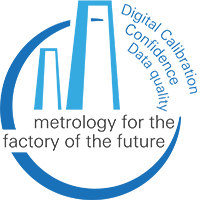The project EMPIR Met4FoF has successfully finished its first quarter and has made very good progress and the first 9 months. This post outlines a couple of the early developments and preliminary results. Overall, this first period laid the foundation for a further successful development of the project.
In work package 1 „Calibration frameworks“ initial prototypes of digitally-enhanced NMI dynamic calibration and of a smart-up unit have been developed.
- Data acquisition via SPI and I2C together with time stamping based on GNS-time information have already been implemented. A communication interface based on OPC-UA provides data streams to connected PCs and will be used for the implementation in the project’s testbeds. Information exchange with EMPIR 17IND02 SmartCom on this task has been initiated.
- The µC-based prototype for time stamping is also considered to handle web services or real-time calculations in parallel to the data acquisition and time stamping functions, which are already implemented and are essential to its core functionality. This device will then be used as „smart-up unit“ to achieve smart traceability for MEMS sensors.
- An initial design of a temperature reference fixture has been drafted. This design assures measurement traceability to temperature unit of MEMS sensors in testing and calibration.
In work package 2 „Mathematical frameworks“ the generic modeling and method questions have been addressed and the agent-based framework has been initiated.
- Detailed interviews with stakeholders and the testbed owners resulted in an overview of potential methods and issues to be addressed in the project.
- Generic models have been defined, which will be the basis for the upcoming method and model developments.
- Design and implementation of the agent-based framework has been started. This will be continuously extended throughout the project to provide a environment to apply the methods being developed.
In work package 3 „Testbeds“ design of experiments and implementation of calibrated sensors have been started. Initial data sets from the testbeds have already been published to start the data analysis development. In collaboration with WP1 and WP2 strategies for further experiments and implementation of sensors have been developed. In the coming months these will be realized.
Results from the project in terms of software and data sets are published and frequently updated at
- The project’s GitHub repository: https://github.com/met4fof
- The project’s Zenodo repository: http://zenodo.org/communities/met4fof/
Several further results will be presented at the MATHMET workshop in November 2019 in Lisbon, Portugal: http://mathmet2019.lnec.pt

